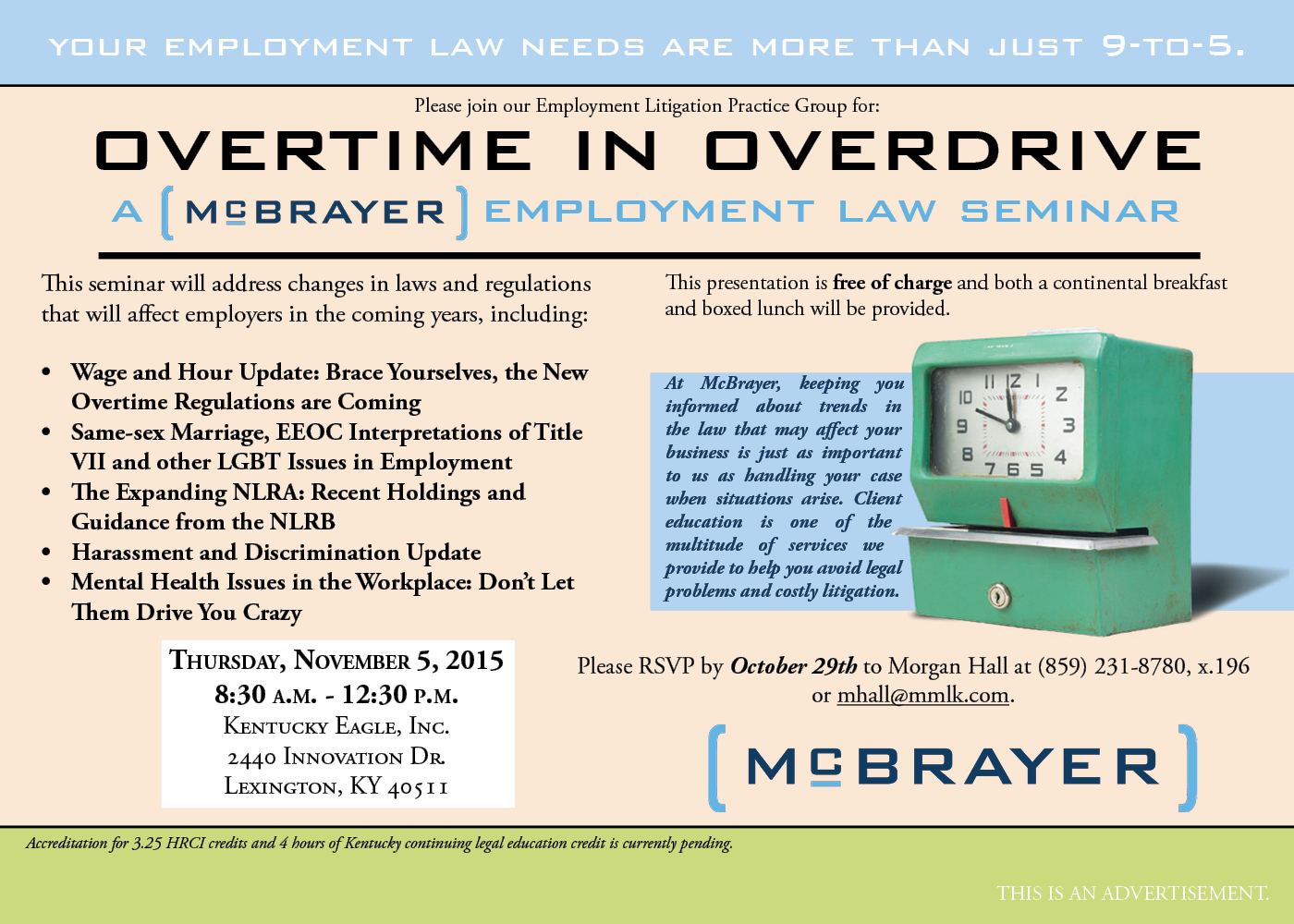Contact Us
Categories
- FTC
- Emotional Support Animals
- Service Animals
- Employee Agreement
- Remote Work
- Federal Trade Commission
- LGBTQ
- Minors
- United States Department of Justice ("DOJ")
- Work from Home
- Arbitration
- Workplace health
- Intellectual Property
- Trade Secrets
- Corporate
- Center for Disease Control
- Americans with Disabilities Act ("ADA")
- FFCRA
- Opioid Epidemic
- Occupational Safety and Health Administration (“OSHA”)
- COVID-19
- Families First Coronavirus Response Act
- H.R.6201
- Health Care Law
- IRS
- Paid Sick Leave
- Temporary Leave
- Treasury
- Coronavirus
- Worker Misclassification
- Labor Law
- Overtime
- Kentucky Unemployment Insurance Commission
- Sexual Harassment
- FMLA Retaliation
- Overtime Rule
- Employer Wellness Programs
- Genetic Information Nondiscrimination Act ("GINA")
- Kentucky minimum wage
- Minimum wage
- Paid Time Off ("PTO")
- Sick Employees
- Wage and Hour
- Employee Benefits
- Employment Discrimination Laws
- Employment Non-Discrimination Act ("ENDA")
- ERISA
- Human Resource Department
- Independent Contractors
- Kentucky Civil Rights Act (“KCRA”)
- OSHA
- Overtime Pay
- ADA Amendments Act of 2008 (“ADAAA”)
- Adverse Employment Action
- Americans with Disabilities Act
- Bring Your Own Device
- BYOD
- Civil Rights
- Compliance
- Department of Labor ("DOL")
- EEOC
- Employee Handbook
- Employee Misconduct
- Employment Law
- Fair Labor Standards Act (FLSA)
- Family and Medical Leave Act (“FMLA”)
- National Labor Relations Act (NLRA)
- National Labor Relations Board (NLRB)
- Pregnancy Discrimination Act
- Social Media
- Social Media Policies
- Title VII of the 1964 Civil Rights Act
- U.S. Department of Labor
- U.S. Equal Employment Opportunity Commission (“EEOC”)
- Uncategorized
- Union
- Volunteer
- Young v. UPS
- Amazon
- Department of Health and Human Services
- Federal contractors
- Kentucky Labor Cabinet’s Occupational Safety and Health Program (KOSH)
- Micro-unit
- Portal-to-Portal Act of 1947
- Security Checks
- Security Screening
- Specialty Healthcare & Rehabilitation Center of Mobile
- U.S. Supreme Court
- Cloud
- Creech v. Brown
- EEOC v. Hill Country Farms
- Equal Employment Opportunity Commission v. Kaplan Higher Education Corp.
- Lane v. Franks
- Mine Safety and Health Administration ("MSHA")
- Non-exempt employees
- Northwestern
- Shazor v. Prof’l Transit Mgmt.
- Web Content Accessibility Guidelines
- Whistleblower
- "Ban-the-box"
- 2013)
- At-will employment
- Berrier v. Bizer
- Bullying
- Chapter 11 Bankruptcy
- Chenzira v. Cincinnati Children’s Hospital Medical Center
- Citizens United v. Federal Election Commission
- Companionship services
- Compensatory time off
- Conestoga Woods Specialties v. Sebelius
- Consumer Credit Protection Act (“CCPA”)
- Crystalline Silica
- Davis-Bacon and Related Acts
- Drug-Free Workplaces
- Earnings
- EEOC v. Fabricut
- EEOC v. The Founders Pavilion
- Ehling v. Monmouth-Ocean Hospital Service Corp.
- Federal Stored Communications Act (“SCA”)
- Giant Food LLC
- Government employees
- Government shutdown
- Home Health Care Workers
- Illness and Injury Reports
- Job applications
- Jury duty
- Kentucky Department of Workers’ Claims
- Kentucky Wage and Hour Act
- KYSHRM 2013
- Mandatory vaccination policies
- Maternity Leave
- McNamara O’Hara Service Contract Act
- Medical Exams
- NFL Bullying Scandal
- Payroll
- Permissible Exposure Level ("PEL")
- Private employers
- Sebelius v. Hobby Lobby Stores
- Senate Bill 157
- SHRM
- Small Business Administration (SBA)
- Violence
- Wage garnishment
- WorkSmart Kentucky
- COBRA
- Contraceptive Mandate
- Defamation
- Defense of Marriage Act (“DOMA”)
- Employee Arrests
- Employee Forms
- Employee Hazards
- Employee of the Month Programs
- Employee photographs
- Employee Training
- Employer Group Health Plans
- Employer Mandate
- Employment Practices Liability Insurance
- Endorsements
- Federal Workplace Agencies
- FICA
- Form I-9
- Freedom of Speech
- Gatto v. United Airlines and allied Aviation Services
- Health-Contingent Wellness Programs
- HIPAA
- House Labor and Industry Committee
- KRS 391.170
- Litigation
- Madry v. Gibraltar National Corporation
- Megivern v. Glacier Hills Incorporated
- Motivating Factor
- Obesity
- Online Account Protection
- Online Defamation
- Participatory Wellness Programs
- Patient Protection and Affordable Care Act
- Pennington v. Wagner’s Pharmacy
- Pension Plans
- Play or Pay
- Posting Requirements
- Record Retention
- Reference checks
- Religious Employer
- Right to Work Bill
- Sequester
- Severance Pay
- Social Media Ownership
- Supervisor
- Supplemental Unemployment Compensation Benefits
- Tangible employment actions
- Tax Refund
- Telecommuting
- Title VII retaliation cases
- Troyer v. T.John.E Productions
- U.S. Citizenship and Immigration Services
- Unfair Labor Practice
- United States v. Quality Stores
- United States v. Windsor
- University of Texas Southwestern Medical Center v. Nassar
- Vance v. Ball State University
- Crisis Management
- Job Description
- Job Requirement
- Kentucky’s Whistleblower Act
- Labor and Pensions ("HELP")
- Municipal Liability
- PhoneDog v. Kravitz
- Public Sector Liability
- Social Networking Online Protection Act (SNOP)
- Social Privacy Laws
- Strategic Enforcement Plan (SEP)
- White v. Baptist Memorial Health Care Corp.
- Wilson v. City of Central City
- Workplace Politics
- Class Action Waivers
- Criminal Background Checks
- Employee Performance Reviews
- Employee Personnel Files
- Federal Arbitration Act (FAA)
- Federal Department of Labor
- Hiring and Firing
- Hosanna-Tabor Opinion
- Informal Discussion Letter (“EEOC Letter”)
- Kentucky Labor Cabinet
- National Labor Relations Act
- Retaliation by Association
- Salary Threshold
- Unemployment Benefits
- Workplace Discrimination, Harassment and Retaliation
- Business Insurance
- Communications Decency Act
- Employee Contracts
- Insurance Coverage
- Internet & Media Law
- Internet Defamation
- Non-Compete Agreement
- Uniformed Services Employment and Reemployment Rights Act
- USERRA
Showing 13 posts in Uncategorized.
Lexington Approves Local Minimum Wage Ordinance

Per the Bluegrass Hospitality Association: More >
FLSA Wage Increase
President Obama announced this week a proposed rule change to the Fair Labor Standards Act (“FLSA”) that will affect every business. The proposed rule change will increase the minimum required salary for employees to qualify as exempt under the FLSA from $455 a week to $970 a week. Accordingly, this rule will require employers to pay overtime to those employees More >
Every step you take…can your employer be watching you?
It sounds like something out of an Orwell novel: an employer demands an employee provide electronic notice of her whereabouts at all times, on and off the clock. The employee must now face a choice – protect her privacy outside of work, or lose her job. This is, however, a true story, and one without a happy ending for the employee. More >
Local Court Ruling Takes the Hands off of Hands On: Tensions between Fairness Ordinances and Religious Freedom Restoration Acts
Businesses should keep a close eye on a case that continues to develop in Lexington, Kentucky, as it highlights the current tensions between emerging, evolving antidiscrimination paradigms and rights of free expression and freedom of religion as they exist under both federal and state laws. More >
The Cost of Buying Silence – Non-disclosure Provisions Run Afoul of Federal Agencies
There’s an inherent tension in requiring an employee to sign an agreement restricting his or her ability to discuss activity in the workplace. On one hand, employers with confidential business practices and trade secrets need to maintain those investments in intellectual capital both during and after employment. On the other, these agreements can stifle both the rights of employees to seek redress of workplace grievances as well as restrict the ability of regulatory agencies to investigate and correct employer practices or violations of the law. The tenor of recent enforcement actions by various agencies as to strict non-disclosure agreements (“NDAs”) and non-disclosure provisions in separation agreements should give employers cause to re-evaluate their own attempts to limit liability. More >
Is a Company’s Release of Claims a Form of Retaliation under Federal Anti-Discrimination Laws? EEOC v. Allstate
The EEOC may have taken enforcement of anti-retaliation provisions of antidiscrimination laws a step too far the Third Circuit ruled in February, and companies transitioning a work force from employees to independent contractors should be pleased at the results. EEOC v. Allstate drew a line between what now counts as retaliation by a company in the face of federal antidiscrimination laws and what is merely a post-termination transaction between an employer and an employee. More >
Don't Miss Our Labor & Employment Seminar Next Week!
Date: September 16, 2014
Time: 7:30 a.m. - 8:00 a.m. -breakfast
8:00 a.m - 9:30 a.m. -seminar
Where: University of Louisville Shelby Campus, The Founders Union Ballroom, 9001 Shelbyville Rd., Louisville, Ky. 40222
As part of Business First's Labor and Employment Seminar Series, McBrayer attorneys explain how job descriptions and performance reviews can be a great tool to protect against employer liability risks. Get real-world advice from speaker Cynthia Effinger on how to effectively write these documents in a non-discriminatory manner and rely on them when faced with a discrimination claim.
To register for this free event, click here.
Cynthia L. Effinger
Cynthia L. Effinger, an Associate of the firm, joined McBrayer law in 2012. Ms. Effinger has a broad range of legal experience gained through 13 years of practice throughout the Commonwealth of Kentucky where her clients conduct business. Ms. Effinger’s practice is concentrated in the areas of employment law and commercial litigation. She also has experience with First Amendment litigation, securities litigation and complex litigation. Ms. Effinger can be reached at ceffinger@mcbrayerfirm.com or at (502) 327-5400, ext. 2316.
Services may be performed by others.
This article does not constitute legal advice.
Another NLRB Ruling That Employers Won’t “Like”
The National Labor Relation Board (“NLRB”) recently issued its latest decision on social media issues and employer policies. In Triple Play Sports Bar & Grille, 361 NLRB No. 31 (2014), the NLRB ruled that a Facebook discussion regarding an employer’s tax withholding calculations and an employee’s “like” of the discussion were protected by the National Labor Relations Act (“NLRA”). While the NLRB has long been concerned with protecting employees’ rights on social media, this marks the first time that the NLRB has held that merely clicking a “like” button can be protected, concerted activity.
The incident arose when a former Triple Play employee posted the following status update on Facebook, “Maybe someone should do the owners of Triple Play a favor and buy it from them. They can’t even do the tax paperwork correctly!!! Now I OWE money…Wtf!!!” Several Facebook friends posted comments in response, including two of Triple Play’s then-current employees. One employee commented, “I owe too. Such an asshole.” A second employee liked the former employee’s status update, but posted no comment. When Triple Play discovered that two of its employees had participated in the Facebook discussion, it terminated them both. The employees sued for wrongful discharge. The administrative law judge (“ALJ”) found that the Facebook discussion was concerted activity because it involved current employees engaged in an ongoing sequence of discussions about employment conditions, specifically, the employer's calculation of tax withholdings.
On appeal, the NLRB upheld the judge’s opinion. The NLRB then underwent a detailed analysis of the “like” action, “We interpret [the] ‘Like’ solely as an expression of approval of the initial status update. Had [he] wished to express approval of any of the additional comments emanating from the initial status update, he could have ‘Liked’ them individually. Determining what the “like” was in reference to was important because the employer alleged that the follow-up comment was defamatory and not protected pursuant to Section 7. Triple Play suggests that the NLRB will analyze individual "likes" to determine the specific post for which it demonstrates support.
The NLRB also went a step further by finding that Triple Play’s “Internet/blogging” policy was unlawful because it was aimed at preventing employees from saying negative statements online, and therefore was an effort to chill protected, concerted activity.
It cannot be emphasized enough that employers should consult with counsel before firing an employee for allegedly defamatory or inappropriate speech that takes place on social network sites. In addition, it is critical that employers work with counsel to draft an appropriate social media policy that can pass muster under the NLRB’s highly subjective and challenging standard.




